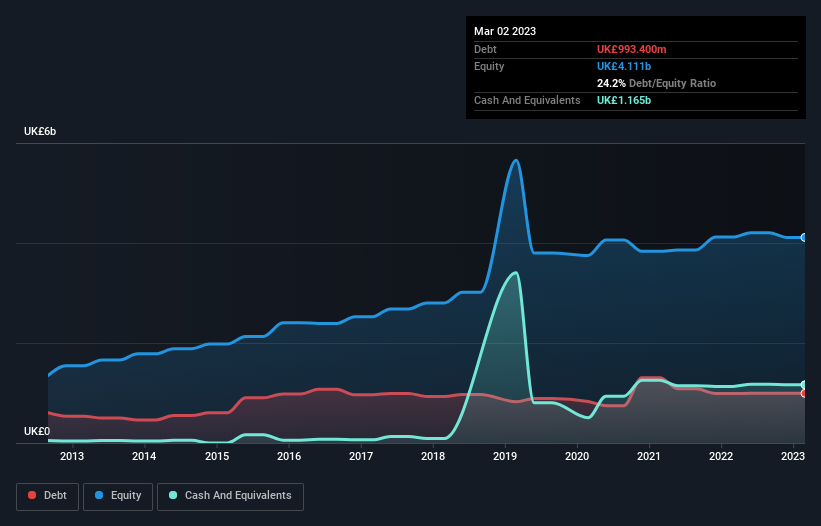
Some say volatility, rather than debt, is the best way to think about risk as an investor, but Warren Buffett famously said that 'Volatility is far from synonymous with risk.' It's only natural to consider a company's balance sheet when you examine how risky it is, since debt is often involved when a business collapses. As with many other companies Whitbread plc (LON:WTB) makes use of debt. But is this debt a concern to shareholders?
When Is Debt Dangerous?
Debt and other liabilities become risky for a business when it cannot easily fulfill those obligations, either with free cash flow or by raising capital at an attractive price. Ultimately, if the company can't fulfill its legal obligations to repay debt, shareholders could walk away with nothing. However, a more usual (but still expensive) situation is where a company must dilute shareholders at a cheap share price simply to get debt under control. Having said that, the most common situation is where a company manages its debt reasonably well - and to its own advantage. The first step when considering a company's debt levels is to consider its cash and debt together.
Check out our latest analysis for Whitbread
What Is Whitbread's Net Debt?
As you can see below, Whitbread had UK£993.4m of debt, at March 2023, which is about the same as the year before. You can click the chart for greater detail. However, its balance sheet shows it holds UK£1.16b in cash, so it actually has UK£171.4m net cash.

How Healthy Is Whitbread's Balance Sheet?
Zooming in on the latest balance sheet data, we can see that Whitbread had liabilities of UK£845.6m due within 12 months and liabilities of UK£4.99b due beyond that. Offsetting these obligations, it had cash of UK£1.16b as well as receivables valued at UK£92.0m due within 12 months. So its liabilities total UK£4.57b more than the combination of its cash and short-term receivables.
This deficit is considerable relative to its market capitalization of UK£6.65b, so it does suggest shareholders should keep an eye on Whitbread's use of debt. Should its lenders demand that it shore up the balance sheet, shareholders would likely face severe dilution. While it does have liabilities worth noting, Whitbread also has more cash than debt, so we're pretty confident it can manage its debt safely.
Notably, Whitbread's EBIT launched higher than Elon Musk, gaining a whopping 636% on last year. The balance sheet is clearly the area to focus on when you are analysing debt. But it is future earnings, more than anything, that will determine Whitbread's ability to maintain a healthy balance sheet going forward. So if you want to see what the professionals think, you might find this free report on analyst profit forecasts to be interesting.
Finally, a company can only pay off debt with cold hard cash, not accounting profits. Whitbread may have net cash on the balance sheet, but it is still interesting to look at how well the business converts its earnings before interest and tax (EBIT) to free cash flow, because that will influence both its need for, and its capacity to manage debt. Over the last two years, Whitbread recorded free cash flow worth a fulsome 92% of its EBIT, which is stronger than we'd usually expect. That positions it well to pay down debt if desirable to do so.
Summing Up
Although Whitbread's balance sheet isn't particularly strong, due to the total liabilities, it is clearly positive to see that it has net cash of UK£171.4m. And it impressed us with free cash flow of UK£281m, being 92% of its EBIT. So we don't have any problem with Whitbread's use of debt. The balance sheet is clearly the area to focus on when you are analysing debt. However, not all investment risk resides within the balance sheet - far from it. Be aware that Whitbread is showing 1 warning sign in our investment analysis , you should know about...
When all is said and done, sometimes its easier to focus on companies that don't even need debt. Readers can access a list of growth stocks with zero net debt 100% free, right now.
Valuation is complex, but we're here to simplify it.
Discover if Whitbread might be undervalued or overvalued with our detailed analysis, featuring fair value estimates, potential risks, dividends, insider trades, and its financial condition.
Access Free AnalysisHave feedback on this article? Concerned about the content? Get in touch with us directly. Alternatively, email editorial-team (at) simplywallst.com.
This article by Simply Wall St is general in nature. We provide commentary based on historical data and analyst forecasts only using an unbiased methodology and our articles are not intended to be financial advice. It does not constitute a recommendation to buy or sell any stock, and does not take account of your objectives, or your financial situation. We aim to bring you long-term focused analysis driven by fundamental data. Note that our analysis may not factor in the latest price-sensitive company announcements or qualitative material. Simply Wall St has no position in any stocks mentioned.
About LSE:WTB
Whitbread
Operates hotels and restaurants in the United Kingdom, Germany, and internationally.
Good value with adequate balance sheet and pays a dividend.


